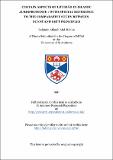Files in this item
Certain aspects of Ijitihād in Islamic jurisprudence : with special reference to the comparative study between Sunnī and Shī'ī principles
Item metadata
| dc.contributor.advisor | Burton, John | |
| dc.contributor.advisor | Calder, Norman | |
| dc.contributor.author | Rahim, Rahimin Affandi Abd. | |
| dc.coverage.spatial | x, 405 p. | en_US |
| dc.date.accessioned | 2018-06-04T13:32:26Z | |
| dc.date.available | 2018-06-04T13:32:26Z | |
| dc.date.issued | 1991-07 | |
| dc.identifier.uri | https://hdl.handle.net/10023/13700 | |
| dc.description.abstract | This work is concerned with certain aspects of Ijtihād in Islamic jurisprudence by the comparative study of Sunnī and Shī'ī views. The chosen aspects are; (1) The historical development of Ijtihād within both traditions. (2) The methodological principles of Ijtihād. (3) The concept of Ijmā’. Chapter one deals with the basic formation of the whole discussion, including the background of the concept of Ijtihād, the origin of Sunnism and Shi'ism and the main reasons for the separation between the two. Chapter two demonstrates the historical development of the theory of Ijtihād on both sides. It can be seen that there are two figures, i.e. al-Shāfi'ī and 'Allāma al- Hillī, which played an important role in elaborating and developing the theory of Ijtihād. Therefore, the discussion of this chapter has been separated into three different sections with reference to these two figures. It is suggested that the main reason for the Ikhtilāf between the two in the concept of Ijtihād was; (1) Different understanding of methods and principles of Ijtihād. (2) Different understanding of the concept of Ijmā'. (3) Different understanding of certain basic principles in Usūl al-Dīn. Each of these matters has been discussed in chapters three to five. | en_US |
| dc.language.iso | en | en_US |
| dc.publisher | University of St Andrews | |
| dc.subject.lcc | BP150.R2 | en |
| dc.subject.lcsh | Islamic law | en |
| dc.title | Certain aspects of Ijitihād in Islamic jurisprudence : with special reference to the comparative study between Sunnī and Shī'ī principles | en_US |
| dc.type | Thesis | en_US |
| dc.contributor.sponsor | University of Malaya | en_US |
| dc.type.qualificationlevel | Masters | en_US |
| dc.publisher.institution | The University of St Andrews | en_US |
This item appears in the following Collection(s)
Items in the St Andrews Research Repository are protected by copyright, with all rights reserved, unless otherwise indicated.

